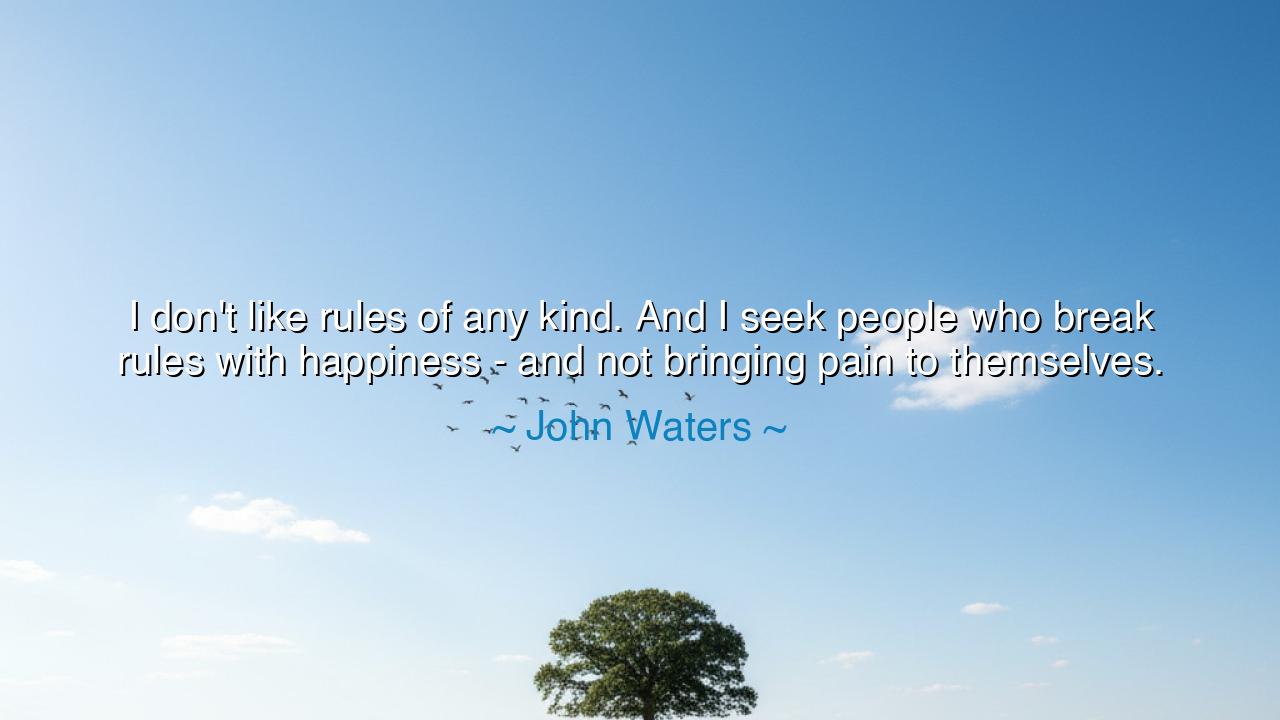
I don't like rules of any kind. And I seek people who break rules
I don't like rules of any kind. And I seek people who break rules with happiness - and not bringing pain to themselves.






“I don’t like rules of any kind. And I seek people who break rules with happiness — and not bringing pain to themselves.” — Thus spoke John Waters, the subversive sage of cinema, whose art and humor have long celebrated those who dare to live beyond the boundaries of convention. Yet within his rebellious declaration lies a wisdom far deeper than mere defiance. Waters does not glorify chaos, nor does he praise destruction. His words are a hymn to freedom, to the courageous joy of those who refuse to be chained by fear or conformity, and who wield rebellion not as a weapon of pain, but as a song of self-expression and light.
Waters, born in Baltimore in 1946, became famous for his eccentric films — strange, provocative, and deeply human. From Pink Flamingos to Hairspray, he gave voice to the outsiders, the misunderstood, and the joyful misfits of society. In a world obsessed with order and judgment, he celebrated the wild beauty of difference. His life and art are testaments to the belief that rules — especially those born from hypocrisy or fear — are meant to be challenged. Yet even as he defied norms, he did so with laughter, not bitterness; with happiness, not hate. In this, he teaches that true rebellion is not about tearing down, but about creating — creating joy, authenticity, and liberation from the prison of expectation.
The ancients, too, understood this delicate balance between order and freedom. Socrates, though he followed reason rather than law, was condemned by his city for corrupting the youth — yet he never sought chaos. His questioning was not destruction; it was illumination. Likewise, the Buddha broke the rigid rules of his time, leaving behind a life of privilege to seek truth beyond caste and ritual. These souls were not anarchists; they were seekers — like Waters, they broke rules to awaken the heart, not to wound it. For not all laws are just, and not all obedience is virtue. The wise know when to bow and when to stand.
To “break rules with happiness” is, in truth, to live with joy in authenticity. It means to step outside the walls built by others — the walls of taste, identity, gender, or morality — and to do so not in anger, but in delight. Such rebellion heals rather than harms. It is the courage of the artist who paints what others call obscene and transforms it into beauty. It is the courage of the thinker who questions power, not to mock, but to free minds. It is the courage of every soul who refuses to shrink to fit the expectations of the world. Waters reminds us that rebellion without love is destruction, but rebellion with happiness is transcendence — a divine act that restores humanity’s laughter and light.
History is filled with such joyful rule-breakers. Consider Galileo Galilei, who dared to look through his telescope and say that the Earth was not the center of the universe. He broke the rules of his age, yet not out of arrogance or malice, but out of a joyous devotion to truth. Though condemned by the Church, he continued his work in quiet defiance, saying, “And yet it moves.” Like Waters’ happy rebels, Galileo’s disobedience was an act of creation — the birth of a new world of understanding. The pain he endured came not from his rebellion, but from the smallness of those who could not yet rejoice in his freedom.
Waters warns, too, that some who break rules do so to their own harm. These are the reckless and the lost, who mistake rebellion for freedom and suffering for depth. He seeks those who defy with awareness, whose rule-breaking springs from joy and not despair. For rebellion born of hate consumes the soul, but rebellion born of love redeems it. The difference lies in intent: to break rules with happiness is to affirm life; to break them in bitterness is to destroy it. Thus, his wisdom echoes that of the mystics and the saints — that the path of liberation must be guided by lightness, by the laughter of one who knows that the truest freedom is inner peace.
The lesson, then, is clear: be brave enough to live beyond the narrow laws that confine your spirit, but gentle enough to harm no one in doing so — not even yourself. Question what you are told is forbidden. Ask whether the rules that bind you serve truth, or simply tradition. When you choose to defy, do so with grace, with humor, and with joy. The world needs not more rebels who destroy, but more creators who liberate — those who show, by their happiness, that freedom and kindness can coexist.
So remember, my child: the rule-breaker who acts in anger becomes a tyrant in turn, but the one who breaks rules with happiness becomes a teacher, a light, a reminder that life itself was never meant to be ordinary. Laugh at the rules that stifle you; honor the ones that protect love and truth. Live boldly, kindly, and free. For as John Waters knew well — the truest rebellion is not shouting in rage, but smiling in joy while walking your own beautiful, ungoverned path.






AAdministratorAdministrator
Welcome, honored guests. Please leave a comment, we will respond soon